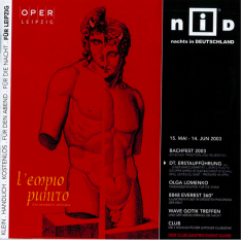Alessandro Melani - L'empio punito (2004)
Alessandro Melani - L'empio punito (2004)

1. Atto 1 2. Atto 2 3. Atto 3 Gaële Le Roi - Acrimante Anne-Lise Sollied - Atamira Kristina Hansson - Cloridoro Salomé Haller - Ipomène Evgueniy Alexiev - Bibi Joao Fernandez - Atrace Emiliano Gonzalez-toro - Delfa Robert Getchell - Telefo et la statue de Tedemo Les Talens Lyriques Christophe Rousset - direction, clavecin et orgue positif Concert donné le vendredi 23 juillet 2004 Opéra Comédie, Festival de Radio France et Montpellier
As if to show that not every unknown composer deserves his fate, Christophe Rousset and Les Talens Lyriques, gave a concert performance of Alessandro Melani’s early (1669) treatment of the Don Giovanni story, L’Empio punito. Performed at the Opera on July 23, it proved to be a frequently engaging retelling. Melani was at his most moving when voices had a chance to blend in duets and trios. Staunchly supported by Rousset and his eight member band of historically informed performers, Anna-Lise Sollied sang the role of Atamira with a voice that seemed to be more appropriate for Wagner and Strauss. Young French soprano Gaële Le Roi continues to impress in the rich Don role, Acrimante. ---Frank Cadenhead, musicweb-international.com
L'EMPIO PUNITO (The punished godless) was composed 1669 for the carnival in Rome, a century before MOZARTs DON GIOVANNI. MELANI and the librettist ACCIAIUOLI treat the Don Juan's material for the first time in the opera. They use metaphors and poetic pictures to express what cannot easily be said at the time. There are neither specific places and spaces, nor exactly comprehensible time courses.
“This opera can only play in the Orient. I think of the Serails, for example. The whole atmosphere and the seclusion of Atraces’ Empire speak for an Eastern world. In the 17th and the 18th century, there was a big fascination in Europe for the Orient, especially in Italy. The proximity to the Ottoman Empire and the cultural difference excited the imagination of European courts, for eroticism and sensuality as well as for a certain form of cruelty, the unspoken, the hidden and the shadowy picture of the Orient. The theater of the 17th and 18th century, MOLIÈRE…, is sensible to the imagery of the Orient, as well as the librettists and composers of that time.”
“The space is a primary matter, comparable with gold, which has not been treated yet. It is a hard, a compact matter with lots of force in it. This world has its own laws, usually nothing can penetrate from the outside - a kind of golden cage. The first act still lies in the shade. The gold is not activated yet. In the course of the piece light comes into this world by Acrimante. He himself is dressed in black, but he brings light into this world. He literally lights it up, so that it shines from inside out. In the transferred sense: all characters learn something about themselves.” ---Éric Vigner, ericvigner.com
download (mp3 @320 kbs):
yandex mediafire ulozto cloudmail.ru bayfiles








